They bank on each other!
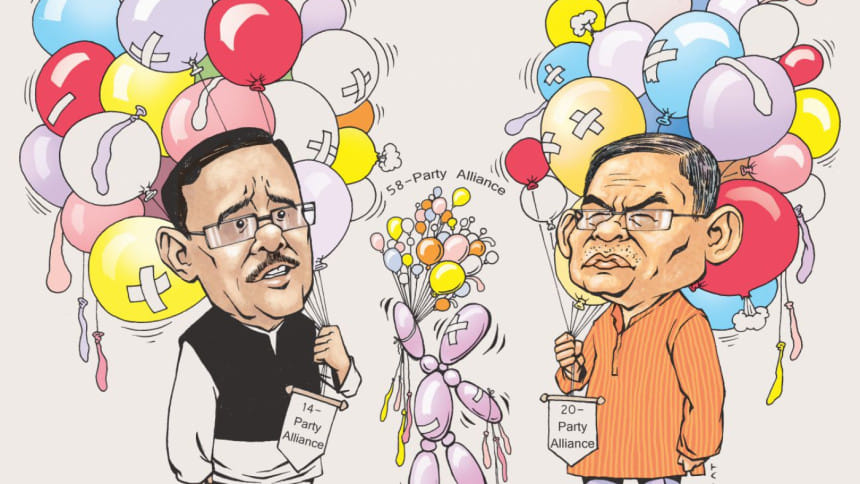
Thirteen years ago, the then Election Commission, led by Justice MA Aziz, got itself caught up in a controversy by inviting 116 political parties to talks over preparing the voter list.
Officials at the EC Secretariat in 2005 had faced difficulties in inviting all the political parties since addresses of many of them could not be found. They existed only in name.
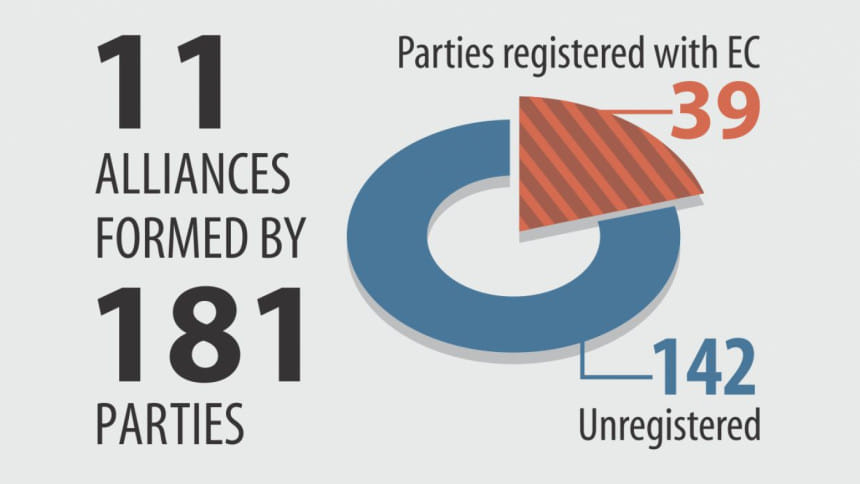
Many were not part of any alliance either.
Thirteen years later, we find around 200 political parties in the country. Interestingly, all of them either belong to or lead alliances. The Daily Star found at least 11 alliances and most of them had been formed by these parties in the last few years. Of the 39 registered political parties, 29 are involved in alliances with other parties.
The number of political parties in the country could be more than 200 if the ones not in any political alliance are counted.
Formation of so many alliances is a recent phenomenon. Most of them have been shaped in the last three or four years.
One of the characteristics of the alliances is that 80 percent of the parties that formed the platforms are not registered with the EC. Since 2008, the registration is a prerequisite to contesting the polls.
Currently, Jatiya Party, the main opposition in parliament, is leading the largest political alliance in terms of the number of partners involved.
The alliance formed in 2017 has 58 parties and only two of them have registration with the EC.
Former BNP minister Nazmul Huda is leading the second largest political alliance called “Bangladesh National Alliance (BNA)”. Formed in May 2014, it has 34 parties but none of them are registered with the EC.
However, until last week, two alliances -- one led by Awami League and other led by the BNP -- were considered major combines of parties. The Jatiya Oikyafront forged on Saturday with the BNP and several other parties drew a lot of public attention.
The high number of alliances raises one important question: why were so many formed in the last four years?
Political analysts think major parties bank on minors to project their strength. On the other hand, small parties think they cannot be part of “power” without forging an alliance with major parties. Smaller parties also make alliances among themselves to gain bargaining ground with major parties.
For instance, Nazmul Huda's alliance wants to join the AL-led alliance ahead of the next elections.
“We have expressed our intention to the prime minister that we want to contest the election under the Awami League-led grand alliance banner," Huda told The Daily Star yesterday.
"We have placed names of 57 candidates to the Awami League. Then we revised it and submitted names of 25 candidates. If we get 10-15 seats we will win those seats,” he said.
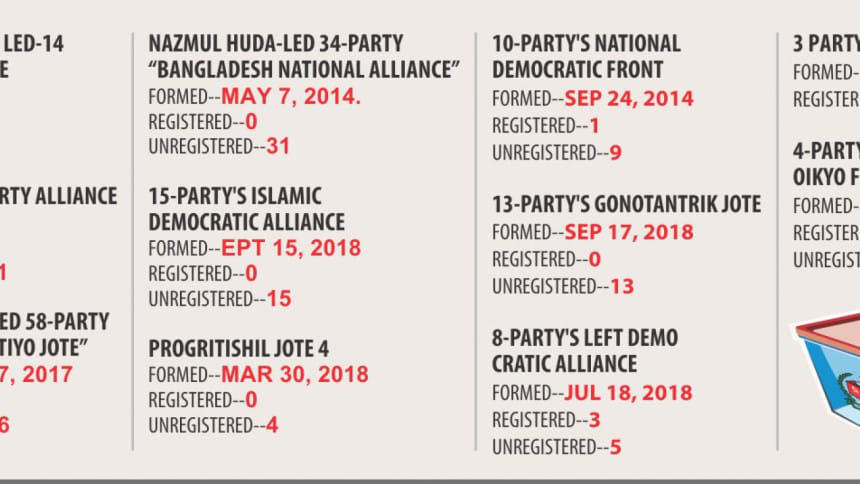
He said none of the partners of the alliance has registration with the EC. "So, if we join the grand alliance and get nominated by it, our candidates will use the electoral symbol of the Awami League, Boat," Huda said.
Even though not a small party, the Jatiya Party is keeping its options open. The Jatiya Party-led alliance is yet to decide whether it would contest the election alone or join the AL-led alliance like it did in the 2008 election.
The next course of action of Jatiya Party now depends on the BNP. If the BNP-led alliance runs in the election, the Jatiya Party and partner of its alliance would join the AL-led alliance.
Asked, ABM Ruhul Amin Howlader, secretary general of the Jatiya Party, said they were yet to start negotiations with alliance partners over seat sharing.
“If our alliance contests the election, we will share a reasonable number of seats with our partners. If we contest under the grand alliance [of the AL], then the negotiations will be different,” he said.
Prof Al Masud Hasanuzzaman, a teacher of government and politics department at Jahangirnagar University, said since restoration of democracy after the fall of the autocratic regime led by Ershad in December 1990, none of the political parties was able to form the government on their own.
"Therefore, major parties started banking on small or name-only political parties, giving birth to the politics of alliance," he said.
In the first election after the fall of the Ershad regime, the BNP won but it did not get the required majority -- 151 seats in parliament -- to form a government. It then formed the government with Jamaat-e-Islami's support.
A very similar thing happened after the June-1996 election. The AL won but could not form the government alone. It had to get the support of the Jatiya Party and Jatiya Samajtantrik Dal.
In 1999 the BNP formed a four-party election alliance with Jatiya Party, Jamaat-e-Islami, and Islami Oikya Jote. The alliance had a landslide victory in the 2001 elections.
Their performance prompted the AL to forge the 14-party alliance with some left-leaning parties in 2005. Later, Jatiya Party joined the AL-led alliance which was called “grand alliance” before the 2008 parliamentary election. The grand alliance won three quarters of the seats in parliament then.
In 2012, the BNP expanded its alliance to 20 parties. The alliance agitated on the streets for two years demanding restoration of the non-partisan election-time caretaker government system that was scrapped in 2011. It, however, boycotted the 2014 election as its demand was not met.
In 2005, the AL-led alliance was called the 14-party alliance but it had 12 parties and four of them were not registered with the EC. Only nine of the 20 parties of the BNP-led alliance were registered with the EC.
Party ideologies or policies do not matter much when forging an alliance.
Political analyst Imtiaz Ahmed, a professor at Dhaka University, said the main aim of the parties was to win in the election. "In the politics of votes, they think there is no alternative to an alliance," he said.
The forging of alliances with name-only parties and making efforts to become part of a major party's platform appears to be a tactic of many parties that do not qualify to get registered with the EC. These parties lack the required number of committees and offices at the district level.
The registration system was introduced before the 2008 parliamentary election to keep the name only parties away from the polls. Before 2008, many name-only parties contested the polls but failed to obtain a reasonable percentage of votes, let alone winning a parliamentary seat.
But their participation made the election management complicated.
For example, 25 small but registered political parties fielded 716 candidates in the 2008 parliamentary election. They bagged only 2.38 percent of the votes and could not win a single seat. Most of them lost their security deposits for poor performance in the polls, according to EC's documents.
Yet, the number of political parties continue to increase.
Prof Al Masud Hasanuzzaman finds the roots in military regimes of the past. He said during military rule, politics of factionalism began in Bangladesh and political parties were increasing as a continuation of that trend. Some leaders of major parties formed new parties leaving their original organisations, he said.
Talking to The Daily Star, Akbar Ali Khan, former adviser to a caretaker government, said there was no limit to how many political parties could exist in a country.
"It is a common phenomenon that the political parties will form alliances before the election because everyone wants to be an MP and everyone wants to go to power.”


 For all latest news, follow The Daily Star's Google News channel.
For all latest news, follow The Daily Star's Google News channel. 

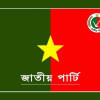
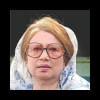

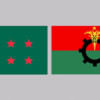


Comments